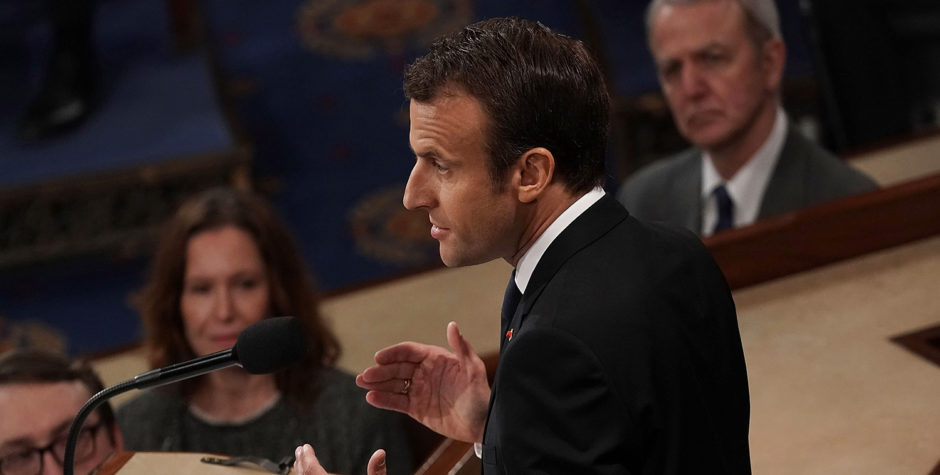Iran: How to Fix a Bad Deal
In the first official State Visit of the Trump Administration, French President Emanuel Macron came to Washington for three days. It was a visit marked by much ceremony as we celebrate our historic relationship with America’s oldest ally. France has been a friend to the people of the United States since the days preceding the American Revolution. Part of Macron’s mission was to convince President Trump to keep the U.S. in the Joint Comprehensive Plan of Action (JCPOA), or Iran Nuclear Deal.
Macron, in an effort to negotiate with Trump, suggested that rather than withdraw from the JCPOA, the agreement must comprehensively address concerns over Iran’s future ability to obtain nuclear weapons and concerns over increased Iranian military action in the Middle East. In other words, rather than withdraw from the deal, the JCPOA should be adjusted and expanded to allay the concerns of the United States.
Macron’s plan has four pillars:
- Severely curb Iran’s Uranium Enrichment Program until 2025.
Questions: What happens after 2025, which is less than seven years away? And, as importantly, exactly how will the West curb that program? As the plan stands now, there are no spot inspections of Iran’s nuclear sites allowed except by Iranian inspectors and outside inspectors must give Iran advanced notice before showing up. The JCPOA is ripe for abuse and secret research and development by Iran on nuclear technology.
- Ensure longer-term curbs on Iran’s nuclear program beyond 2025.
If one believes Iran’s rhetoric, there will be no “tweaking” of the Iran Nuclear Deal. Iran’s Foreign Minister wrote on Twitter that his nation’s compliance with the present agreement is “either all or nothing.” So, again, the larger question is “How, exactly, will the nations who signed the JCPOA (the Five Permanent Members of the UN Security Council, plus Germany and Iran) get the Iranians to expand the present agreement in order to curb their nuclear program beyond 2025?”
- Restrict Iran’s ballistic missile program.
This idea would be laughable if it were not so serious. Despite UN restrictions on Iran’s ballistic missile program, it continues to defy those restrictions even now, with impunity! As recently as April 18th, on Army Day, Iran paraded a new missile that is its most advanced medium-range ballistic missile to date, one capable of striking Israel or any other nation in the region. It is suspected that Iran is already cooperating with its ally North Korea on advanced missile technology. We know for certain that North Korean scientists are stationed in Iran, and vice versa.
- Contain Iran’s activities in the Middle East, particularly in Yemen, Syria, Iraq and Lebanon.
Again, the question is “How?”
Today Iran supports and supplies the Houthi Rebels in Yemen, rebels who regularly fire Iranian missiles into the Kingdom of Saudi Arabia. Iran continues to station its militias in Iraq and is attempting to interfere with upcoming Iraqi elections. In Lebanon, Iran’s proxy, Hezbollah, has one of the largest non-state militaries in the world. Hezbollah has hundreds of rockets and missiles, including new ones with a more sophisticated guidance system supplied by Iran, in Lebanon and these weapons have one target: Israel. In Syria, Iran has stationed its ground and air forces in Syria and plans to keep them there. Under the so-called “De-confliction Agreement” with the U.S., Turkey and Russia, Iran now has troops stationed along the border with Israel. Iran’s intent is to have a permanent military presence in Syria and prop up the brutal regime of Assad.
Finally, in his speech before a Joint Session of the United States Congress, Macron stated: “Iran shall not possess any nuclear weapons. Not now, not in five years, not in ten years, never!” His statement is reminiscent of similar statements made by the United States and its allies about North Korea. North Korea now has nuclear weapons and the world is trying to figure out what to do about it.
On Tuesday, Iranian President Hassan Rouhani warned of “severe consequences” for the U.S. should it withdraw from the Iran nuclear deal. Iran’s Foreign Minister Zarif stated that if the U.S. withdraws from the deal, Iran would restart its nuclear weapons program, even if the other nations of the JCPOA stay in the agreement. More than likely, as North Korea has done before them, Iran is already secretly continuing its research and development of nuclear weapons. We cannot know for sure, as the inspection program of the JCPOA is so convoluted and weak that it is virtually impossible to know with certainty where Iran is in its quest for nuclear weapons. Once they have these weapons, the game changes and the options of what to do decrease markedly.
As with many complex geo-political problems, the devil is in the details. President Macron gave a good speech, full of hope and promise. The four pillars he presented sound good. But problems remain because there is no realistic way to achieve these lofty goals short of cancelling the JCPOA, reenacting the strong sanctions against Iran, and returning to the policies that were in place until President Obama committed the U.S. to an agreement that is weak, ill-advised, and unenforceable.
President Trump has an important decision to make by May 12. He must decide whether or not Iran is living up to its commitments in the JCPOA. If not, the question then becomes, what do we do about it? Benjamin Netanyahu, who knows that Israel has more to lose in this proposition than anyone else correctly explains our dilemma: “The deal has to be either fully fixed or fully nixed.”
